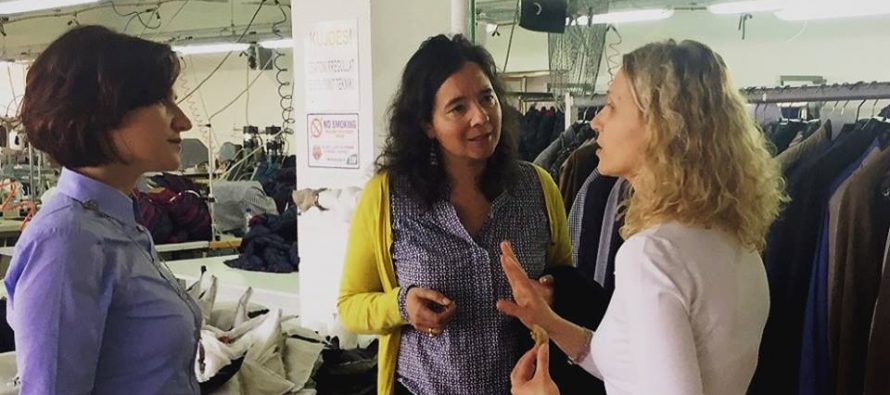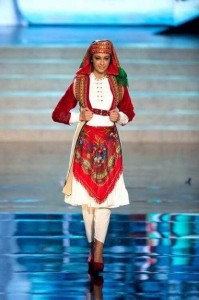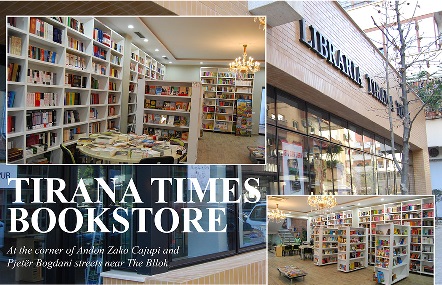Dutch companies mull over Albania textile opportunities

Story Highlights
- "I am delighted we have moved to another stage where both Dutch and Albanian companies will seriously and concretely explore match making and partnership opportunities," Dutch ambassador to Albania Dewi van de Weerd told a dozen representatives of Dutch companies while on a study tour on sustainable textile and fashion in Albania
Related Articles

Opening of this month's Dutch Study & Trade Mission on Sustainable Textile and Fashion. Photo: Netherlands Embassy in Tirana
TIRANA, April 19 - Having emerged as the country second largest foreign investor, but with trade exchanges remaining at quite modest levels, the Netherlands is looking to explore new opportunities that would boost ties between the two countries, especially in the textile sector, one of Albania's most developed industry producing the country's top exports along with the footwear segment.
The first trade mission of Dutch textile and fashion businesses came to Albania this month, exploring opportunities to cooperate with Albanian companies, who are active across all garment value chain.
The visit came two years after Dutch experts of CSR Netherlands, the Center of Excellence for Dutch companies striving towards corporate social responsibility, identified the fashion sector as one of Albania's most promising, together with the ICT and agritourism.
"I am delighted we have moved to another stage where both Dutch and Albanian companies will seriously and concretely explore match making and partnership opportunities," Dutch ambassador to Albania Dewi van de Weerd told a dozen representatives of Dutch companies while on a study tour on sustainable textile and fashion in Albania.
"I strongly believe that both countries have something to offer to each- other in the fashion sector: Albanian companies can offer their competitive production costs, short lead times and eagerness to open up to the world and move up the value chain ladder towards full cycle production. On the other side, Dutch companies offer a dynamic and innovative market, an experienced entrepreneurship attitude and commonly reliable partnership when it comes to orders’ payments," she added.
A 2016 roadmap published with the support of the Dutch embassy in Tirana has recommended Albania as an interesting textile and leather production country for Dutch brands and buyers.
Typical for Albania is the high quality, fast lead times and small, flexible orders, says the roadmap for companies that want to source sustainable and responsible garments and shoes.
“The quality of work is high: the majority of garment and footwear factories are producing for Italian quality brands. Add the short distance to the EU, and the ability to source small quantities and you have a sourcing country that offers good options – with CSR – for small and large Dutch fashion brands,” says the publication, adding that Albania’s strategic geographical location allows an easy and rapid reach to the Netherlands.
Albania’s garment and footwear sector, producing the country’s top exports and employing about 100,000 people, mainly relies on cheap labor costs with the overwhelming majority of exports destined to neighboring Italy. The sector’s annual turnover is estimated at €500 million, accounting for 40 percent of the country’s total exports.
The 500 companies operating in the country are mostly involved in CM and CMT production (cut-make-trim) although leading companies in the Albanian garment sector are striving to create their own in-house brands. This means that raw materials, designs and patterns are imported. Limited value is added in these types of production, which makes the sector vulnerable for competition in the Far East.
In terms of labelling, the current CMT business keeps Albanian garment manufacturers from being recognized with a ‘Made in Albania’ label. Experts say most garments are finished in Italy and will be sold as ‘Made in Italy’ due to the non-preferential rules of origin. These rules state that the country in which the last substantial transformation of a product took place, is relevant for providing the country of origin.
However, Albania offers interesting opportunities for re-shoring trends and several front running companies have upgraded their production processes to full cycle production, experts say. The biggest shoe producing company in Albania, DoniAnna, also exporting to the Netherlands, has its own brand that is running alone a total turnover of €40 million.
Albania’s apparel and footwear labour force is dominated by female employees accounting for 90 percent of total workforce, most of whom get minimum wages of 22,000 lek (€158) a month.
The Netherlands has emerged as the second largest foreign direct investor in Albania in the past couple of years and is on track to further increase its presence in the Balkan country thanks to increased investment in the oil industry and most recently retail trade by the Royal Dutch Shell and Spar International retailer.
Dutch companies in Albania also operate in the banking, mail delivery and agriculture taking their stock of FDI to €843 million at the end of 2016, according to the central bank.
However, trade exchanges between the two countries remain modest at only about €43 million.




